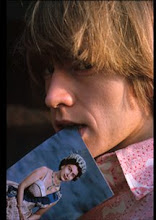
This footage of The Animals miming their number one hit "The House of the Rising Sun" was taken from the 1965 music review film entitled Pop Gear (aka Go-Go Mania), hosted by beloved DJ and British television personality Jimmy Savile.
Pop Gear showcased the following British acts:
- Pre-credits: She Loves You – The Beatles (from Pathe newsreel footage of their Nov. 20, 1963, Manchester concert)
- Little Children - Billy J. Kramer and the Dakotas
- Make Him Mine - Susan Maughan
- Juliet - The Four Pennies
- The House of the Rising Sun - The Animals
- A Little Loving - The Fourmost
- He's in Town - The Rockin’ Berries
- Have I the Right - The Honeycombs
- Rinky Dink - Sounds Incorporated
- World Without Love - Peter and Gordon
- Walk Away - Matt Monroe
- I'm Into Something Good - Herman's Hermits
- Tommy Quickly and the Reno Four - Humpty Dumpty
- Watcha Gonna Do - Billie Davis
- My Babe - The Spencer Davis Group
- Tobacco Road - The Nashville Teens
- What In The World's Come Over You - The Rockin' Berries
- For Mama - Matt Monroe
- Black Girl - The Four Pennies
- William Tell - Sounds Incorporated
- Google Eyes - The Nashville Teens
- Eyes - The Honeycombs
- Don't Let Me Be Misunderstood - The Animals
- Pop Gear - Matt Monroe
- Closing credits: Twist And Shout – The Beatles
The Animals, the Nashville Teens, and the Spencer Davis Group distinctively stand out from the other acts featured on Pop Gear because of their blues/folk influences, standing in sharp contrast to the pop sounds of the other acts. (Stay tuned for a feature on many of these bands in a forthcoming entries.)
The Animals began life as the Alan Price Combo in their rough hometown of Newcastle, a background that certainly helped infuse their r&b sound with a tough, authentic quality. The band consisted of Hilton Valentine on lead guitar, Alan Price on organ, Chas Chandler on bass and John Steel on drums. When the soulful, outrageous Eric Burdon joined as lead vocalist in 1962, the band became known as "The Animals" because of their wild stage act. When famed London record producer Mickie Most discovered them in 1963, the Animals were quickly signed to Columbia records and began recording their first single, "Baby Let Me Take You Home," a toned-down version of a song that had appeared on Bob Dylan's first Columbia album. However, it was their second single, an old folk ballad which was also recorded by Dylan, that propelled the Animals to the top of the UK and US singles charts: "The House of the Rising Sun." This raw, mournful track about a New Orleans brothel perfectly suited the Animals' style and showcased Burdon's wailing vocals. It is undoubtedly one of the major songs of the British Invasion period. The hits continued for the Animals until 1966, when the soul of Burdon was psychedelicized and the rifts between band members could not be mended. Burdon emerged with a New Animals in 1967, and later joined WAR, where he continued to find chart success. Chas Chandler became a respected producer and manager, who most notably discovered Jimi Hendrix.
One of my favorite Animals' recordings is a live show with blues legend Sonny Boy Williamson, recorded December 30, 1963. The Fuel label released this on CD in 2000 under the title The Animals: Taken Alive! Check it out for a glimpse into their crazed, energetic live shows!
(References: British Beat by Chris May and Tim Phillips, Tapestry of Delights by Vernon Joynson, and Way Beyond Compare by John C. Winn. My scan of The Animals Is Here EP from the liner notes to The Animals: A's, B's and EP's.)








